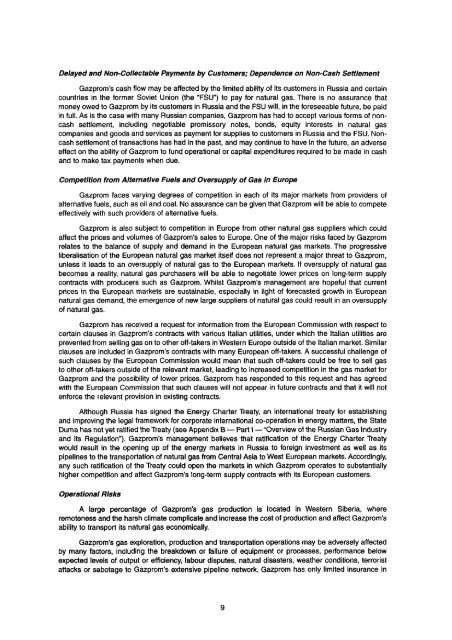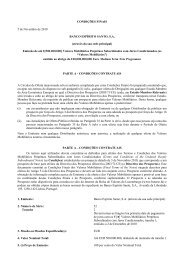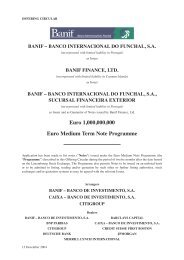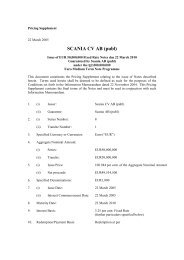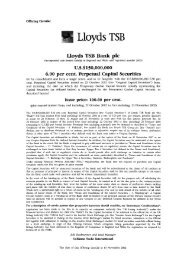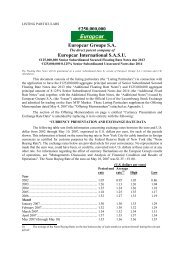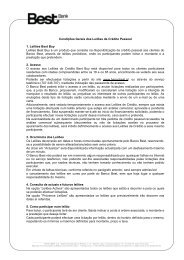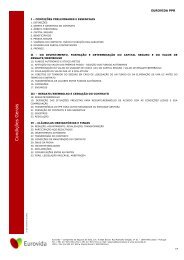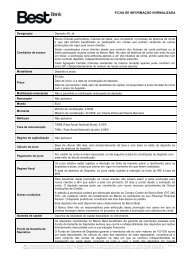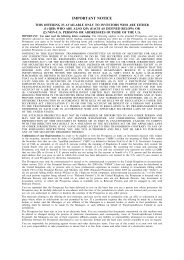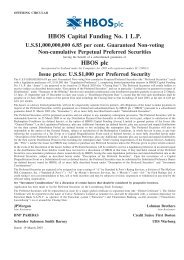Open Joint Stock Company Gazprom
Open Joint Stock Company Gazprom
Open Joint Stock Company Gazprom
You also want an ePaper? Increase the reach of your titles
YUMPU automatically turns print PDFs into web optimized ePapers that Google loves.
Delayed and Non-Collectable Payments by Customers; Dependence on Non-Cash Settlement<strong>Gazprom</strong>'s cash flow may be affected by the limited ability of its customers in Russia and certaincountries in the former Soviet Union (the "FSU") to pay for natural gas. There is no assurance thatmoney owed to <strong>Gazprom</strong> by its customers in Russia and the FSU will, in the foreseeable future, be paidin full. As is the case with many Russian companies, <strong>Gazprom</strong> has had to accept various forms of noncashsettlement, including negotiable promissory notes, bonds, equity interests in natural gascompanies and goods and services as payment for supplies to customers in Russia and the FSU. Noncashsettlement of transactions has had in the past, and may continue to have in the future, an adverseeffect on the ability of <strong>Gazprom</strong> to fund operational or capital expenditures required to be made in cashand to make tax payments when due.Competition from Alternative Fuels and Oversupply of Gas in Europe<strong>Gazprom</strong> faces varying degrees of competition in each of its major markets from providers ofalternative fuels, such as oil and coal. No assurance can be given that <strong>Gazprom</strong> will be able to competeeffectively with such providers of alternative fuels.<strong>Gazprom</strong> is also subject to competition in Europe from other natural gas suppliers which couldaffect the prices and volumes of <strong>Gazprom</strong>'s sales to Europe. One of the major risks faced by <strong>Gazprom</strong>relates to the balance of supply and demand in the European natural gas markets. The progressiveliberalisation of the European natural gas market itself does not represent a major threat to <strong>Gazprom</strong>,unless it leads to an oversupply of natural gas to the European markets. If oversupply of natural gasbecomes a reality, natural gas purchasers will be able to negotiate lower prices on long-term supplycontracts with producers such as <strong>Gazprom</strong>. Whilst <strong>Gazprom</strong>'s management are hopeful that currentprices in the European markets are sustainable, especially in light of forecasted growth in Europeannatural gas demand, the emergence of new large suppliers of natural gas could result in an oversupplyof natural gas.<strong>Gazprom</strong> has received a request for information from the European Commission with respect tocertain clauses in <strong>Gazprom</strong>'s contracts with various Italian utilities, under which the Italian utilities areprevented from selling gas on to other off-takers in Western Europe outside of the Italian market. Similarclauses are included in <strong>Gazprom</strong>'s contracts with many European off-takers. A successful challenge ofsuch clauses by the European Commission would mean that such off-takers could be free to sell gasto other off-takers outside of the relevant market, leading to increased competition in the gas market for<strong>Gazprom</strong> and the possibility of lower prices. <strong>Gazprom</strong> has responded to this request and has agreedwith the European Commission that such clauses will not appear in future contracts and that it will notenforce the relevant provision in existing contracts.Although Russia has signed the Energy Charter Treaty, an international treaty for establishingand improving the legal framework for corporate international co-operation in energy matters, the StateDuma has not yet ratified the Treaty (see Appendix B — Part I — "Overview of the Russian Gas Industryand its Regulation"). <strong>Gazprom</strong>'s management believes that ratification of the Energy Charter Treatywould result in the opening up of the energy markets in Russia to foreign investment as well as itspipelines to the transportation of natural gas from Central Asia to West European markets. Accordingly,any such ratification of the Treaty could open the markets in which <strong>Gazprom</strong> operates to substantiallyhigher competition and affect <strong>Gazprom</strong>'s long-term supply contracts with its European customers.Operational RisksA large percentage of <strong>Gazprom</strong>'s gas production is located in Western Siberia, whereremoteness and the harsh climate complicate and increase the cost of production and affect <strong>Gazprom</strong>'sability to transport its natural gas economically.<strong>Gazprom</strong>'s gas exploration, production and transportation operations may be adversely affectedby many factors, including the breakdown or failure of equipment or processes, performance belowexpected levels of output or efficiency, labour disputes, natural disasters, weather conditions, terroristattacks or sabotage to <strong>Gazprom</strong>'s extensive pipeline network. <strong>Gazprom</strong> has only limited insurance in9


